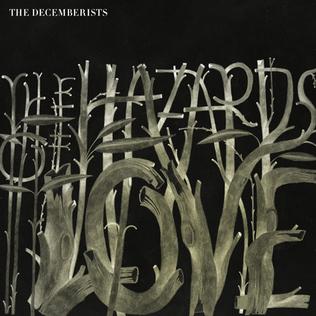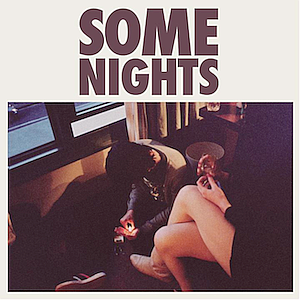
I’d consider myself a sucker for anything even remotely related to a concept album.
This is because I’m willing to grant a large amount of praise to those that can craft songs exploring an overarching theme, or create a twisting narrative that the music serves as a soundtrack for. All in all, it takes an impressive amount of planning, discipline and foresight to add theses elements to a song cycle, making them into something more than just a set of well made songs.
But for every great concept album, there are ones that tend to overreach, and this is a story about one of those.
Bless Colin Meloy’s little delusions of storytelling grandeur, but The Decemberists slip and fumble on their fifth album overall, The Hazards Of Love. What could have been a fascinating exploration of love that’s been won and lost, degenerates into a half-baked mess of stunted characters and languishing arrangements to match.
However, the album’s biggest fault seems to lie with the fact that there is too much musical similarity between these tracks. While it’s understood that musical motifs will pop up later if there is a story involved, something to ground the listener in the thick of the action and remind them of themes, nearly every track on The Hazards Of Love builds up in the same way. These tracks seem to plod along with soft acoustic beginnings, large bluesy riffs, a bridge that goes nowhere, and then a melody we heard two tracks ago. Revisiting musical melodies is perfectly fine, it’s worked for everyone from Pink Floyd to Green Day, but when Meloy uses the same melody four separate occasions with minimal change (“The Hazards Of Love 1,2,3, AND 4") he’s not grounding a theme, he’s being lazy.
Much to its detriment, The Hazards Of Love is an album that can only be appreciated in parts, which makes it difficult as each of the tracks segue into each other.
What’s even more depressing is that the quaint pop folk charm of most Decemberists albums has been replaced with Meloy’s wish to become Jack White. “A Bower Scene” begins innocently enough with tensely palm muted riffs before erupting in cock-rock bravado. There’s nothing wrong with heavy, but Meloy fails to realize his band works best with folky ramblings and quaint synthesizer lines, rather than bombastic blues swagger.
Still, not all is lost. “The Rake’s Song” is classic Decemberists, with a climbing vocal hook over held together by thick bass, enormous drums, and hypnotic acoustic guitar. Channeling the album’s supposed villain, Meloy brings a darkness rarely seen in Decemberist songs with lines such as, “Charlotte I buried after feeding her foxglove/Dawn was easy, she drowned in the bath/Isaiah fought but was easily bested/Burned his body for incurring my wrath…”
Elsewhere, “Annan Water” features a lush and spacious organ break while “The Wanting Comes In Waves/Repaid” sports angelically staggered harmonies that seem to ascend towards something otherworldly. Suffice to say, it’s not that the music itself is awful on The Hazards Of Love, but those moments of musical beauty are few and far between, and never seem to last for a full song. And while none of the music is poorly written, it just seems phoned in.
While The Hazards Of Love is musically hit or miss, what really bogs it down is how muddled Meloy’s story comes across to listeners. Sure, some concept albums require the listener to delve past the layers of loud guitar to get to the album’s nuances, but The Hazards Of Love obscures this to the point of nonsense. There should be some balance between catching the flashes of plot points without needing an accompanying lyrics sheet to figure out what Meloy is rambling about.
Essentially, The Hazards Of Love’s convoluted plot revolves around Meloy (Or William as he’s referred to in the story) and his love Margaret (Whose parts are sung by Becky Stark). Through circumstances not quite decipherable, Margaret gets captured at some point, raped at another (By Meloy’s other persona, The Rake) and falls at the mercy of a envious Queen (Voiced by Shara Worden), ultimately concluding in bloody battle as Meloy’s William attempts to save her.
If you feel like Meloy’s reaching for Rush-like ridiculousness, you’re not alone here.
While the fantastic element of the story seems to fit right at home in the form of a concept album or a rock opera, Meloy doesn’t give these characters enough time to develop, nor a sense of space for their existence. They live as absolutes, and commit actions before you can garner a good feel for them. In the end, it feels like Meloy’s love of the concept album’s structure gets the better of him, and he forgets how to tell stories, something the Decemberists have always excelled at.
But I suppose that’s the hazard of concept albums: They are a tricky beast at best, a beast that requires the right kind of love, and the right kind of restraint.
Sounds Like: The Crane Wife (The Decemberists), Consolers Of The Lonely (The Raconteurs), Wincing The Night Away (The Shins)
Key Cuts: The Wanting Comes In Waves/Repaid, The Rake’s Song, Annan Water
Click on the artwork to sample some of The Hazards Of Love for yourself!
How Does British Athletic Performance Impact National Identity?
-
Influence of Athletic Performance on National Identity Athletic performance
deeply intertwines with national identity, shaping how citizens feel about
thei...
3 months ago














1 comments:
I once thought as you do about this - more annoyed than anything else, and fondly recalling the Picaresque days. However, seeing the Decemberists perform the album live in it's has given me a new appreciation.
I think the narrative, while obtuse, is dream-like in its vagueness but that the music ties the whole thing together.
Songs like 'the Wanting comes in Waves' (which is reprised both at the beginning and the end), 'Annon Water' and 'the Rake's song' are Colin Meloy at his song-writing best; and the four different incarnations of the title track are the perfect signposts throughout (my favourit is probably the 3rd one, with the ghostly little kids).
Here's hoping this album grows on you.
Post a Comment